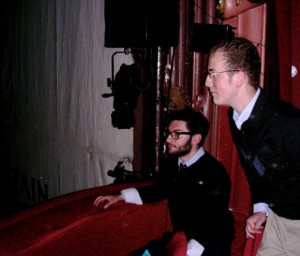Theatre in England is a casual affair. In the United States, a night at the theatre is a formal event full of dressing up and champagne, a night a kin to going to a highbrow gala if you will. To some extent in England theatre is a reason to look nice, but it is not the event it is the United States. This is apparent by the five plays I have had the pleasure of seeing in the short time I have been in London.
“How plays in a month?” You may be asking, “How can he/the program possibly afford such a feat.” There in lies the casual atmosphere of the theatre. Tickets can be acquired relatively cheaply, I myself was able to procure box seats for Arthur Miller’s All My Sons a few nights ago for only 10 pounds and a few less hours of sleep.
Perhaps it is because being on Broadway just costs more for the production and therefore for the viewers, but the lower costs of London’s theatre scene allows both the viewers and the audiences to try something new. People, even on our program, are much more inclined to go see something they wouldn’t normally because it is only 10 pounds and not an outstanding 50-dollar balcony ticket like in the United States.
The lower costs also allow for more experimental theatre. Plays have the privilege to try things that the audience may not like because there is not as much of a monetary responsibility to the theatre. In the United States, a show will not be put on Broadway unless someone decides it can make money, and if it can make money it will go on an absurd 10 year run. With all of the heavy hitting Broadway shows that have been around for decades taking up the theatres, it leaves very little open space for the new, risky, and innovative.
I’m not saying entirely that theatre on Broadway has become stagnant and purely a moneymaking business, but I am saying that mostly. Off-Broadway is still a place in New York where one can see a risky new show, like this summers hit Bloody Bloody Andrew Jackson which I had the great honor of seeing in early July. To me though, it’s not about the surprising hit that emerges from the risky new theatre, its about the bombs. What shows you about London’s theatre scene are the flops, the things you see in Timeout magainze with only one star and a skull and cross bones warning you not to see the show.
Seeing Bedlam at the Globe theatre was not one of my fondest memories of London but the fact that a show of that caliber, written by novice playwright, could make it to one of London’s most iconic theatres without fear of a monetary disaster is inspiring and gives me hope for theatre to come.


1 response so far ↓
maryc // Sep 19th 2010 at 06:57
I agree that witnessing the greater accessibility to theatre here in London has been incredible. From my experience back at home with countless dance performances, some plays, musical concerts and operas, the cost of attendance is oftentimes unreal. With the economic recession especially, the ticket prices in the States has increased dramatically (at least around where I live). The variety of theatre, music, and dance available at home is quite expansive, but the prices truly are ridiculous. Coming here, I was blown away. Of course, I must remember I am in London. However, I have thoroughly appreciated the easy access people have to every form of art (museums included). It has become such an integral part of a Londoner’s life that perhaps they no longer see attending shows as such a “special occasion” where one has to dress up and make it a big to-do.
This freedom of expression for less well-known and/or novice artists is generally appreciated by both the viewers and the artists.
You must log in to post a comment.